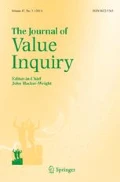Notes
See Daniel Boisvert, “Expressive-Assertivism,” Pacific Philosophical Quarterly, vol. 89, no. 2 (2008); see also David Copp, “Realist Expressivism: A Neglected Option for Moral Realism,” Social Philosophy and Policy, vol. 18, no. 2 (2001); Michael Ridge, “Ecumenical Expressivism: Finessing Frege,” Ethics vol. 116, no. 2 (2006); Ridge, “Ecumenical Expressivism: The Best of Both Worlds?” in Rush Shafer-Landau, ed., Oxford Studies in Metaethics, vol. 2 (2007); Mark Schroeder, “Hybrid Expressivism: Virtues and Vices,” Ethics, vol. 119, no. 2 (2009).
See A. J. Ayer, Language, Truth and Logic (Mineola, N.Y: Dover, 1952), pp. 102–114; see also Simon Blackburn, “Attitudes and Contents,” in Essays in Quasi-Realism (Oxford: Oxford University Press, 1993); Blackburn, Spreading the Word (Oxford: Oxford University Press, 1984); Allan Gibbard, Wise Choices, Apt Feelings: A Theory of Normative Judgment (Cambridge, Mass.: Harvard University Press, 1990).
See Richard Joyce, The Myth of Morality (Cambridge, England: Cambridge University Press, 2002); see also J. L. Mackie, Ethics: Inventing Right and Wrong (London: Penguin, 1977).
Mackie, op. cit., p. 35.
See Russ Shafer-Landau, Moral Realism (Oxford: Oxford University Press, 2003), pp. 23–24.
See Blackburn, Ruling Passions (Oxford: Oxford University Press, 1998), p. 75.
Ibid., p. 79.
See Paul Horwich, Truth (Oxford: Blackwell, 1998).
See James Dreier, “Meta-ethics and the Problem of Creeping Minimalism,” Philosophical Perspectives, vol. 18, no. 1 (2004).
Ibid., pp. 27–28.
See Peter Geach, “Imperative and Deontic Logic,” Analysis, vol. 18, no. 3 (1958); see also Geach, “Ascriptivism,” Philosophical Review, vol. 69, no. 2 (1960); Geach, “Assertion,” The Philosophical Review, vol. 74, no. 4 (1965); John Searle, “Meaning and Speech Acts,” Philosophical Review, vol. 71, no. 4 (1962).
Geach, “Assertion,” p. 463.
See ibid., p. 449.
See Blackburn, Spreading the Word, pp. 189–196; see also Gibbard, Thinking How to Live (Cambridge, Mass.: Harvard University Press, 2003).
See Blackburn, Spreading the Word, p. 195.
See ibid., pp. 195–196.
Mackie, op. cit, p. 35.
See David Hume, A Treatise of Human Nature, David Fate Norton and Mary J. Norton eds. (Oxford: Oxford University Press, 2000), p. 266.
See Shafer-Landau, op. cit., p. 125.
Ibid.
See ibid., pp. 125–127.
See Mackie, op. cit, p. 35; see also Joyce, op. cit., p. 9.
See Joyce, op. cit., p. 5.
See Mackie, op. cit., pp. 42–46.
See ibid., p. 43.
I would like to thank two anonymous reviewers and the Editor-in-Chief of the Journal of Value Inquiry, Thomas Magnell, for offering very helpful comments on this article. I am indebted also to David Agler for providing careful and insightful commentary on an early draft.
Author information
Authors and Affiliations
Corresponding author
Rights and permissions
About this article
Cite this article
Svoboda, T. Hybridizing Moral Expressivism and Moral Error Theory. J Value Inquiry 45, 37–48 (2011). https://doi.org/10.1007/s10790-011-9259-z
Published:
Issue Date:
DOI: https://doi.org/10.1007/s10790-011-9259-z

